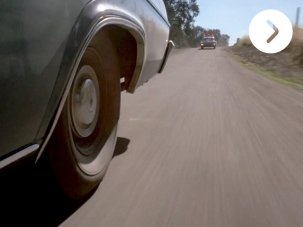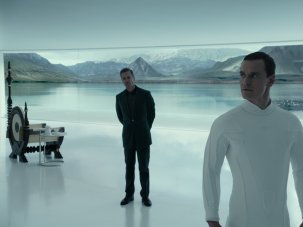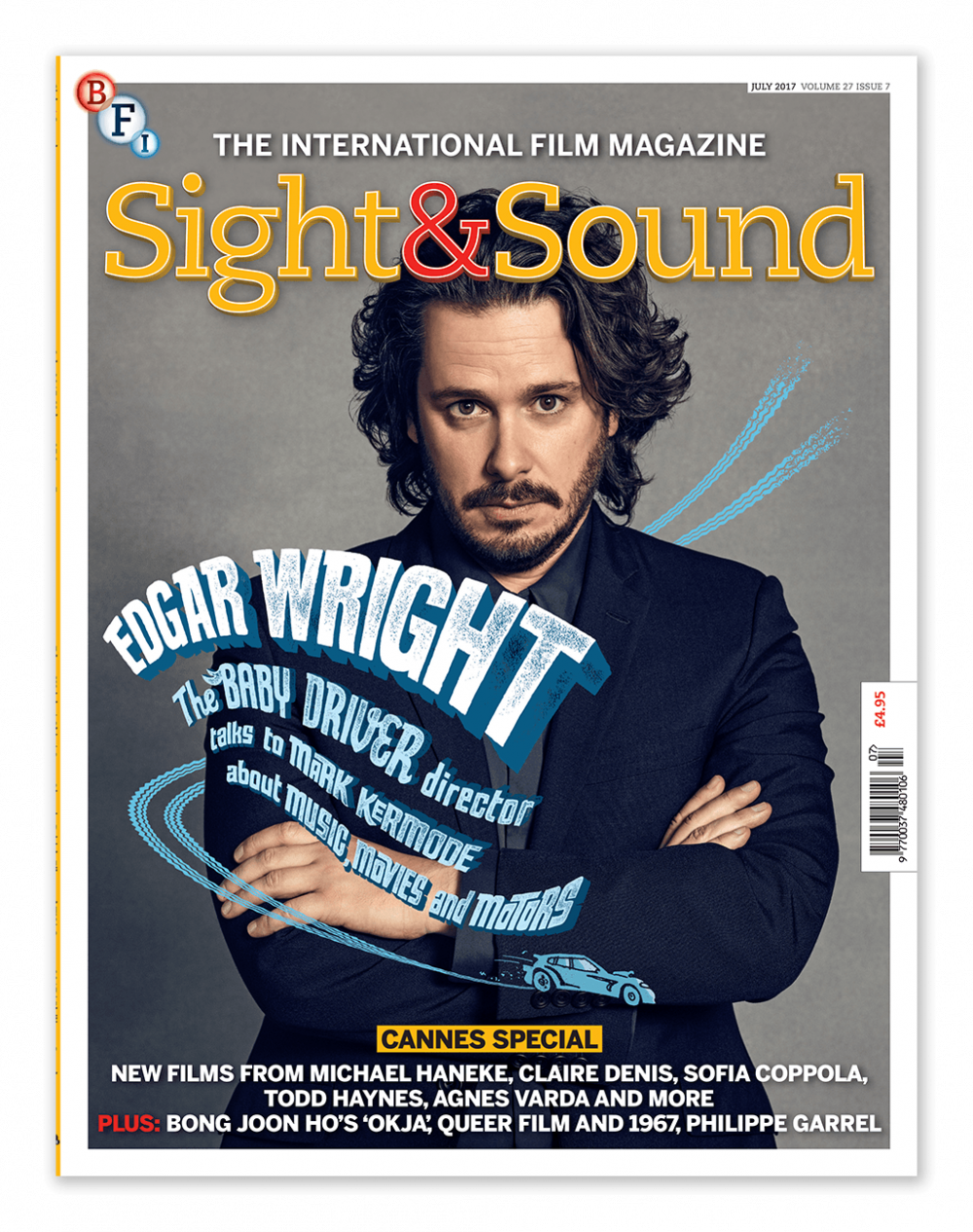
“The most consistently joy-giving run of films of the past ten years.”
Posted to subscribers and available digitally 2 June
→ Buy a print issue
→ Access the digital edition
→
On UK newsstands 6 June
Will it surprise anyone to learn that our reviewer is referring to the work of cult director (and this month’s S&S cover star) Edgar Wright, whose sixth feature Baby Driver sees him riffing on the likes of John Landis’s Blues Brothers and Walter Hill’s The Driver in a movie that blends the musical and action-comedy genres?
Ansel Elgort plays the titular getaway driver who uses portable playlists to drown out tinnitus and naively gets in way over his head with Kevin Spacey’s criminal kingpin on the mean streets of Atlanta. Wright’s usual slick, kinetic visuals are married with impressive car chases and action set-pieces spun into carefully choreographed ballets scored to an eclectic soul and funk-dominated soundtrack by the likes of Martha and the Vandellas, Golden Earring, Bob & Earl, Young MC plus many more.
Irresistible? We think so. Mark Kermode sat down with Wright for an in-depth chat about his working methods and influences, walking off the production of Ant-Man and the season of films he’s curated for BFI Southbank: titled Car Car Land.
► ‘Once upon a pair of wheels’… Edgar Wright on Baby Driver and the classic car movies
From Atlanta to the Croisette, where our intrepid critics Nick James and Isabel Stevens delved deep into this year’s Cannes Film Festival offerings across the various strands. It was not an outstanding year by all accounts, with several Cannes regulars – Michael Haneke, Claude Lanthimos, Todd Haynes, Hong Sang Soo, Claude Lanzmann – below their best. But there were still fascinating films to be seen, many of which appeared to invoke the spirit of Luis Buñuel by virtue of their spirited attacks on the bourgeoisie, including Ruben Östlund’s Palme d’Or winner The Square, which makes a bizarre game of consequences out of its plot, with shades of Roy Andersson at times.
Other notable competition entries included Loveless, by the Russian director Andrey Zvyagintsev, whose portrait of a dissolving marriage and a family in crisis suggested wider political resonances; while away from the competition, Isabel Stevens discovered fresh new visions particularly from young women filmmakers such as Chloé Zhao (The Rider) and Rungano Nyoni (I Am not a Witch), and in particular Leonor Serraille’s Jeune Femme, a freewheeling delight about a thirtysomething woman in freefall.
Continuing on a French theme, Adrian Martin and Cristina Alvarez López consider the career of Philippe Garrell (his new film played in Directors’ Fortnight), locating a central, constant situation of “an impulsive, anarchic flight from society, driven by the idealism of romantic love” throughout his oeuvre. Garrell has been making films now for more than 50 years, condensing, refracting and reimagining the highs and lows of his bohemian, marginal life in unforgettable, searing images. Several of Garrell’s films, some not released before in the UK, can be seen on the Mubi platform this month.
Korean maestro Bong Joon-ho’s new film Okja provoked uproar and boos at Cannes this year by virtue of its being a Netflix production solely for the small screen. Leaving aside the controversy over how it’ll be distributed and viewed, Tony Rayns found much to admire in its strange, utterly singular tale of a genetically modified pig being fought over by a conglomerate and a young girl determined to save its life. At times it feels like a kids’ film, but belied by other elements; “the engagement with anti-capitalist activism is, to say the least, ferocious,” says Rayns. Bong is a master filmmaker, so wherever you end up seeing it, top entertainment is guaranteed.
Our final feature this month marks the 50th anniversary of the partial decriminalisation of homosexuality, providing our writer Simon McCallum with a prime opportunity to look back at the portrayal of queer lives in British film and TV of the 1960s and 70s. Prior to Nighthawks, Britain’s first explicitly gay feature film released in 1978, there were numerous courageous attempts to depict the often difficult realities of gay life, especially in Granada’s On Trial series and most daringly perhaps in Victim, starring Dirk Bogarde. McCallum’s article is a salutary reminder of how cinema and TV not only reflects but shapes social and political attitudes.
Features
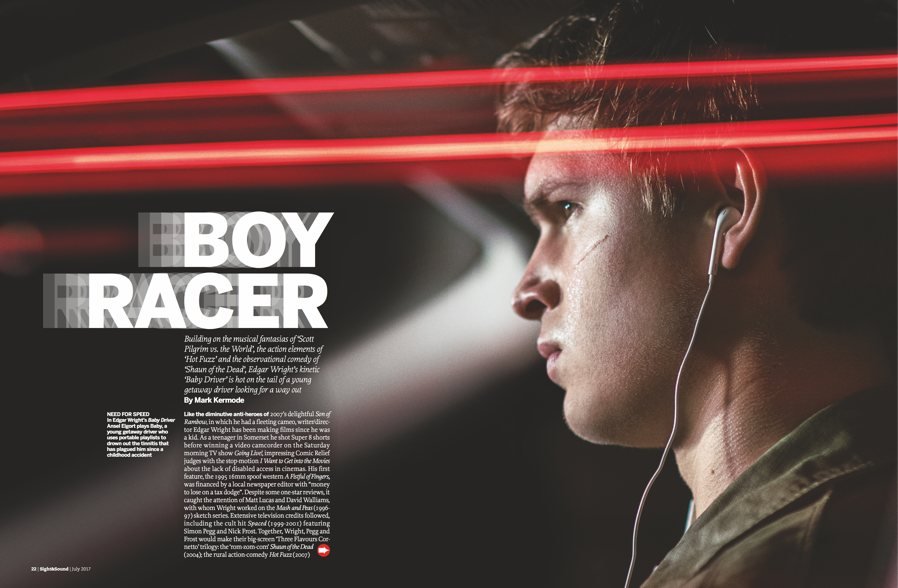
Boy Racer
Building on the musical fantasias of Scott Pilgrim vs. the World, the action elements of Hot Fuzz and the observational comedy of Shaun of the Dead, Edgar Wright’s kinetic Baby Driver is hot on the tail of a young getaway driver looking for a way out. By Mark Kermode
+
The fast and the furious
Edgar Wright’s Car Car Land season at the BFI Southbank, London, revisits the American car-chase movies of the 1960s and 70s – a world of alienated machismo and burning rubber. By Christina Newland.
► ‘Once upon a pair of wheels’… Edgar Wright on Baby Driver and the classic car movies
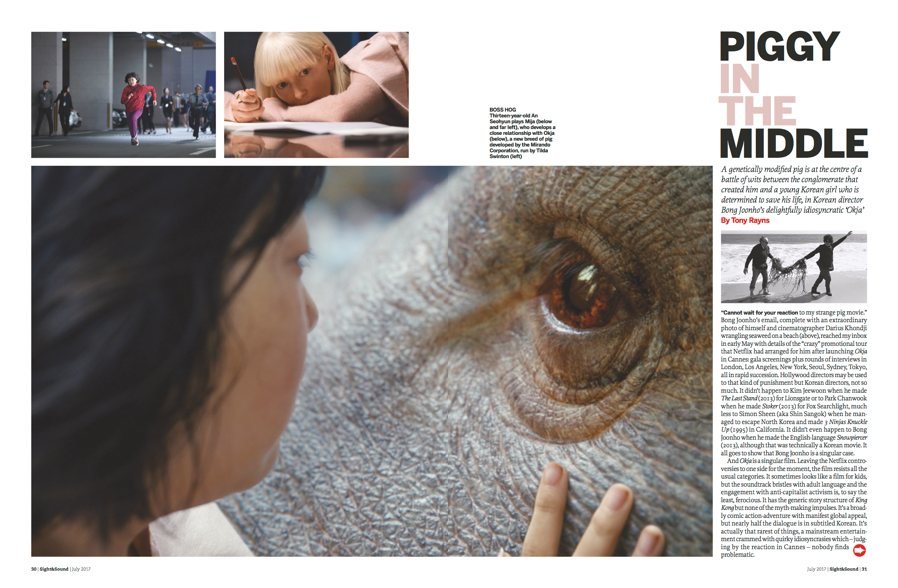
Piggy in the Middle
A genetically modified pig is at the centre of a battle of wits between the conglomerate that created him and a young Korean girl who is determined to save his life, in Korean director Bong Joonho’s delightfully idiosyncratic Okja. By Tony Rayns.
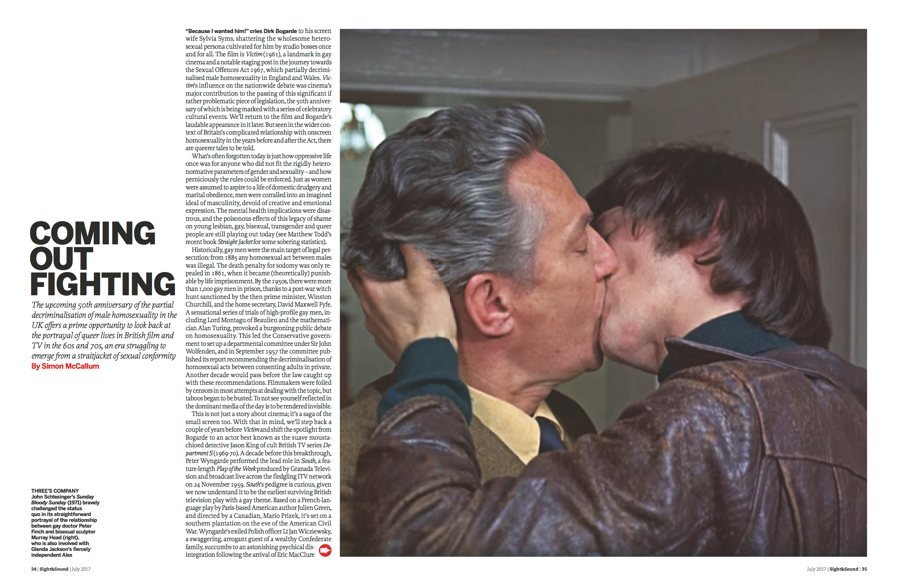
Coming Out Fighting
The upcoming 50th anniversary of the partial decriminalisation of male homosexuality in the UK offers a prime opportunity to look back at the portrayal of queer lives in British film and TV in the 60s and 70s, an era struggling to emerge from a straitjacket of sexual conformity. By Simon McCallum.
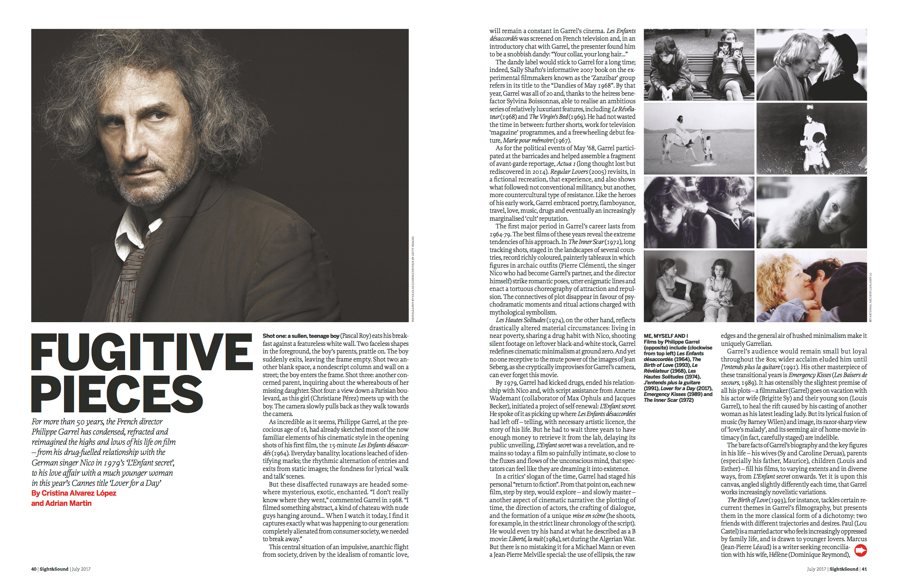
Fugitive Pieces
For more than 50 years, the French director Philippe Garrel has condensed, refracted and reimagined the highs and lows of his life on film – from his drug-fuelled relationship with the German singer Nico in 1979’s L’Enfant secret, to his love affair with a much younger woman in this year’s Cannes title Lover for a Day. By Cristina Alvarez López and Adrian Martin.
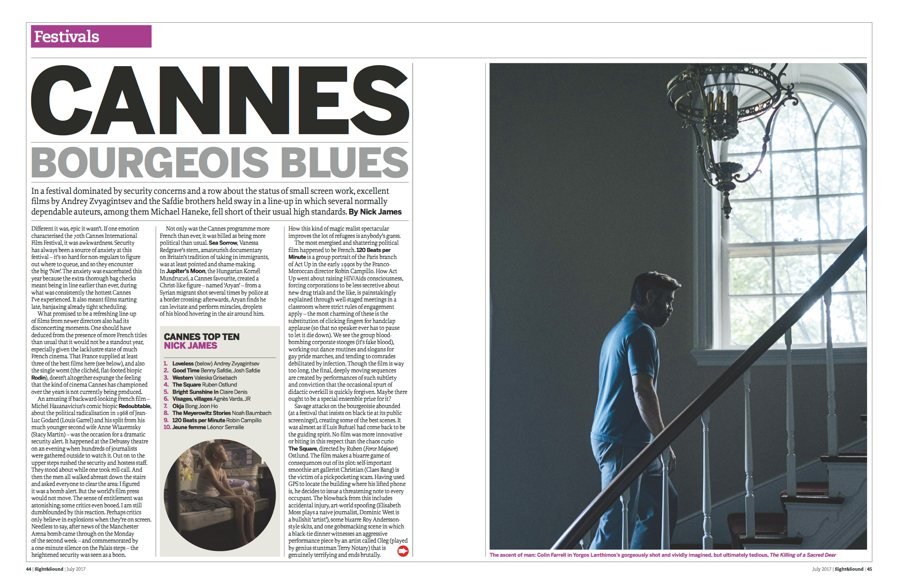
Cannes: Bourgeois Blues
In a festival dominated by security concerns and a row about the status of small screen work, excellent films by Andrey Zvyagintsev and the Safdie brothers held sway in a line-up in which several normally dependable auteurs, among them Michael Haneke, fell short of their usual high standards. By Nick James.
+ Fringe benefits
Away from the Competition, there is plenty of filmmaking that makes up in originality and freedom anything it lacks in polish. By Isabel Stevens.
Regulars
Editorial
On latterday prolific directors
Rushes
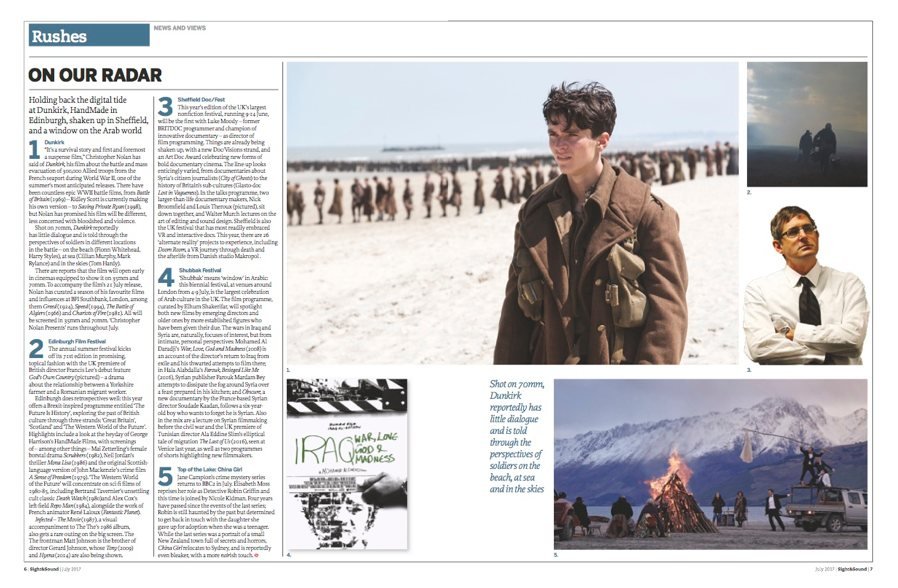
Our Rushes section
On our radar
Holding back the digital tide at Dunkirk, HandMade in Edinburgh, shaken up in Sheffield, and a window on the Arab world.
Interview: Everyday people
Koreeda Hirokazu, the director of the piercing family drama After the Storm, discusses manga, Ken Loach and learning how to be a father. By Nick Roddick.
The numbers
The Handmaiden and Korean cinema at the UK box office. By Charles Gant.
Rediscovery: Mortal combat
The spectre of Death haunts Fritz Lang’s breakthrough 1921 film Der müde Tod, a harrowing quartet of tales of lovers lost. By Pamela Hutchinson.
Dispatches: Dead calm
Nicole Kidman has always been fearless choosing her roles, and her composure has rarely faltered in a dizzying variety of genres and tones. By Mark Cousins.
Wide Angle
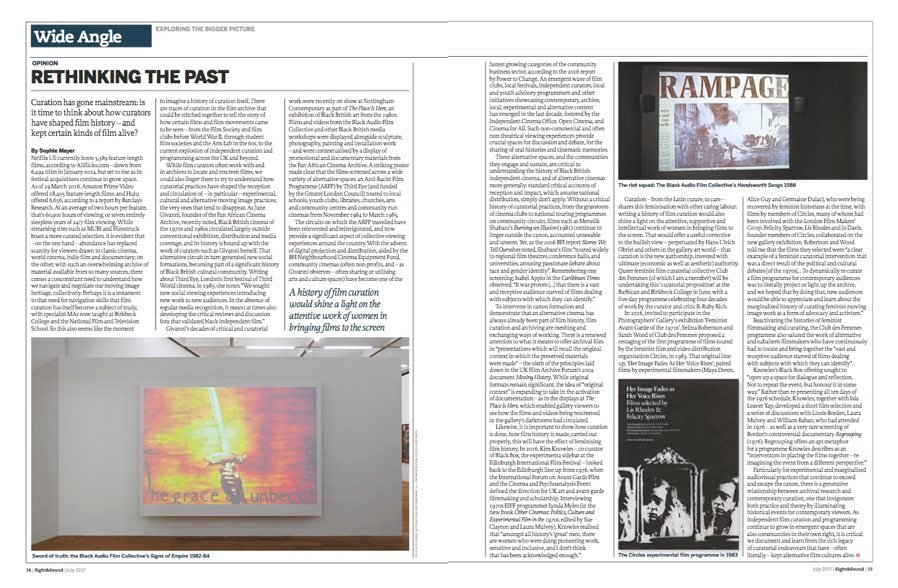
Our Wide Angle section
Opinion: Rethinking the past
Curation has gone mainstream: is it time to think about how curators have shaped film history – and kept certain kinds of film alive? By Sophie Mayer.
Primal screen: Erased marx
Little remains of the Marx Brothers’ first film but rumours: can we imagine what a silent Marx comedy would have been like? By David Cairns.
Artists’ moving image: The neverending story
The indeterminate, constantly shifting digital landscapes in the work of Ian Cheng offer the viewer a glimpse of eternity. By Nick Pinkerton.
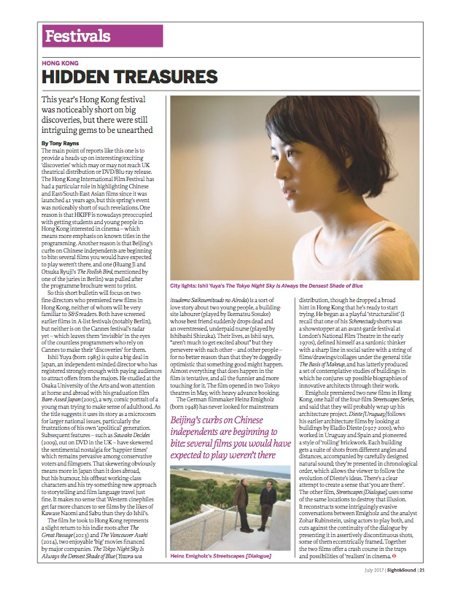
Our Festivals section
Festivals
Hong Kong: Hidden treasures
This year’s Hong Kong festival was noticeably short on big discoveries, but there were still intriguing gems to be unearthed. By Tony Rayns.
Reviews
Films of the month
By the Time It Gets Dark
Edith Walks
The Human Surge
plus reviews of
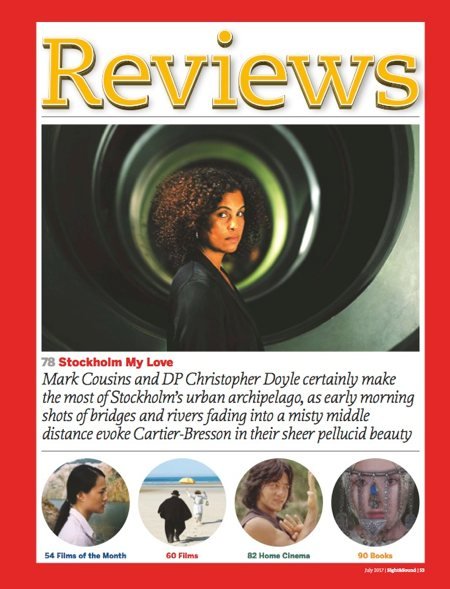
Our Reviews section
Alien: Covenant
Alone in Berlin
American Hero
Baby Driver
Baywatch
Berlin Syndrome
Centre of My World
Churchill
Destination Unknown
Detour
Dough
From the Land of the Moon
Gifted
A Good Day to Die
Hoka Hep
Guardians of the Galaxy Vol. 2
Hampstead
In This Corner of the World
Kedi
King Arthur: Legend of the Sword
Lost in Lebanon
A Man Called Ove
My Cousin Rachel
Okja
The Seasons in Quincy: Four Portraits of John Berger
Slack Bay
Snatched
Stockholm My Love
Summer in the Forest
Tommy’s Honour
Whitney: Can I Be Me
Wilson
Home Cinema features
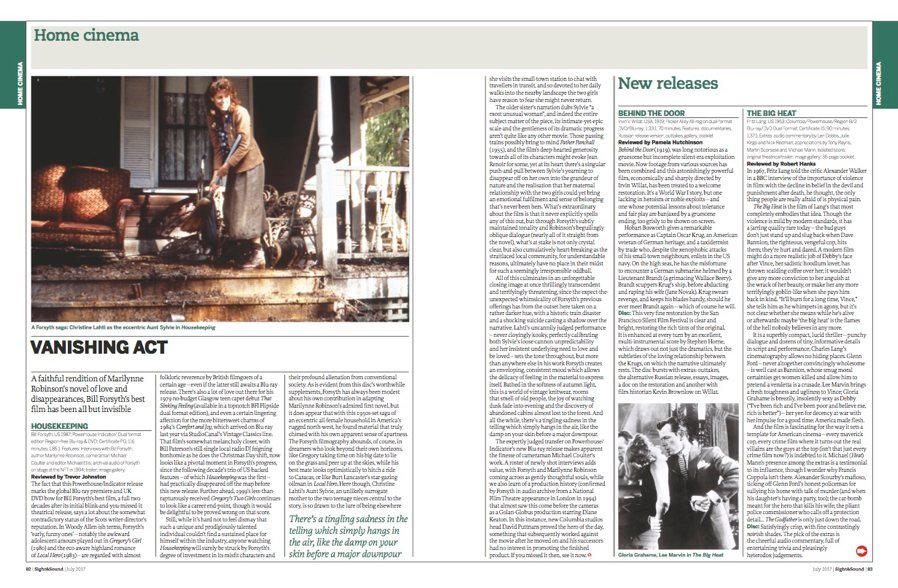
Our Home Cinema section
Vanishing act: Housekeeping
A faithful rendition of Marilynne Robinson’s novel of love and disappearances, Bill Forsyth’s best film has been all but invisible. By Trevor Johnston.
Revival: Rita, Sue and Bob Too
Thirty years after its first release, Alan Clarke’s disquieting, raucous picture of life at the bottom remains hopelessly hilarious. By Kate Stables.
Lost and found: Sinful Davey
There are good reasons why John Huston’s period romp hasn’t lasted in the collective memory – but also some why it’s worth a glance. By Jonathan Coe.
plus reviews of
Behind the Door
The Big Heat
Hardcore
Drunken Master
Hard Times
Madame de…
Mandy, Melody
Spotlight on a Murderer
Television
1990, Seasons 1 and 2
Star Maidens
Books
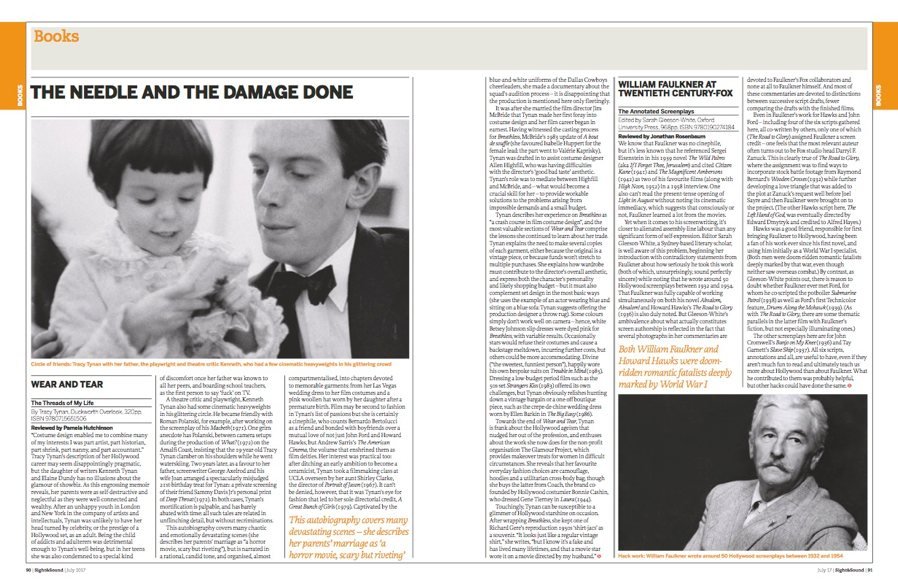
Wear and Tear: The Threads of My Life by Tracy Tynan (Duckworth Overlook) reviewed by Pamela Hutchinson
William Faulkner at Twentieth Century-Fox edited by Sarah Gleeson-White (Oxford University Press) reviewed by Jonathan Rosenbaum
Boro: Walerian Borowczyk by Daniel Bird (Centre Pompidou/Friends of Walerian Borowczyk/Carlotta) reviewed by David Thompson
The Ordinary Man of Cinema by Jean Louis Schefer, translated by Max Cavitch, Noura Wedell and Paul Grant (Semiotext(e)) reviewed by Nick Pinkerton
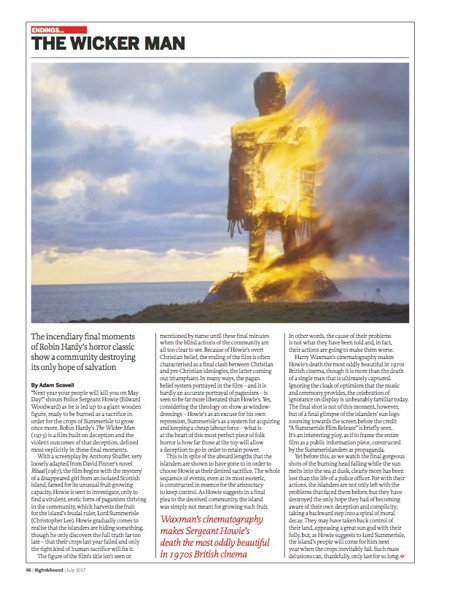
Our Endings section
Letters
Leni Riefenstahl’s awfulness every which way
Lady Macbeth’s cheap thrills
Get Out’s necessary horror
Watching Fassbinder in Pinochet’s Chile
Films of the month as opposed to best films of the month
Captain America’s non-aggression and Absolutely Fabulous’s non-nostalgia
The first-ever orchestral film score
Endings
The Wicker Man
The incendiary final moments of Robin Hardy’s horror classic show a community destroying its only hope of salvation. By Adam Scovell.
Further reading
-
The Digital Edition and Archive quick link
Log in here to your digital edition and archive subscription, take a look at the packages on offer and buy a subscription.




